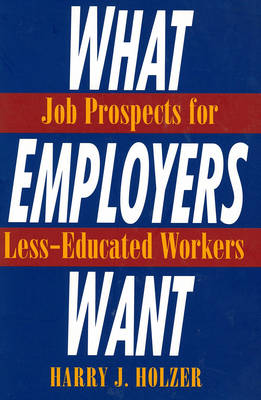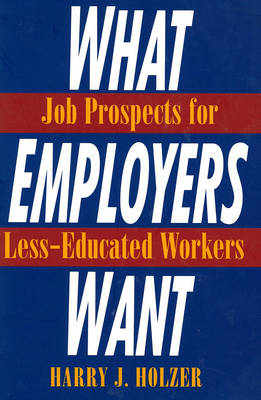
En raison d'une grêve chez bpost, votre commande pourrait être retardée. Vous avez besoin d’un livre rapidement ? Nos magasins vous accueillent à bras ouverts !
- Retrait gratuit dans votre magasin Club
- 7.000.000 titres dans notre catalogue
- Payer en toute sécurité
- Toujours un magasin près de chez vous
En raison de la grêve chez bpost, votre commande pourrait être retardée. Vous avez besoin d’un livre rapidement ? Nos magasins vous accueillent à bras ouverts !
- Retrait gratuit dans votre magasin Club
- 7.000.0000 titres dans notre catalogue
- Payer en toute sécurité
- Toujours un magasin près de chez vous
Description
A very important contribution to the field of labor economics, and in particular to the understanding of the labor market forworkers with relatively low skill levels. I think we have the sense that the market looks bad, but haven't been clear on how bad it is, or how it got that way. What Employers Want provides some of the answers and identifies the important questions. It is essential reading. --Jeffrey S. Zax, University of Colorado at Boulder The substantial deterioration in employment and earnings among the nation's less-educated workers, especially minorities and younger males in the nation's big cities, has been tentatively ascribed to a variety of causes: an increase in required job skills, the movement of companies from the cities to the suburbs, and a rising unwillingness to hire minority job seekers. What Employers Want is the first book to replace conjecture about today's job market with first-hand information gleaned from employers about who gets hired. Drawn from asurvey of over 3,000 employers in four major metropolitan areas--Los Angeles, Boston, Atlanta, and Detroit--this volume provides a wealth of data on what jobs are available to the less-educated, in what industries, what skills they require, where they are located, what they pay, and how they are filled. The evidence points to a dramatic surge in suburban, white-collar jobs. The manufacturing industry--once a steady employer of blue-collar workers--has been eclipsed by the expanding retail trade and service industries, where the vast majority of jobs are in clerical, managerial, or sales positions. Since manufacturing establishments have been the most likely employers to move from the central cities to the suburbs, the shortage of jobs for low-skill urban workers is particularly acute. In the central cities, the problem is compounded and available jobs remain vacant because employers increasingly require greater cognitive and social skills as well as specific job-related experience. Holzer reveals the extent to which minorities are routinely excluded by employer recruitment and screening practices that rely heavily on testing, informal referrals, and stable work histories. The inaccessible location and discriminatory hiring patterns of suburban employers further limit the hiring of black males in particular, while earnings, especially for minority females, remain low. Proponents of welfare reform often assume that stricter work requirements and shorter eligibility periods will effectively channel welfare recipients toward steady employment and off federal subsidies. What Employers Want directly challenges this premise and demonstrates that only concerted efforts to close the gap between urban employers and inner city residents can produce healthy levels of employment in the nation's cities. Professor Holzer outlines the measures that will benecessary--targeted education and training programs, improved transportation and job placement, heightened enforcement of antidiscrimination laws, and aggressive job creation strategies. Repairing urban labor markets will not be easy. This book shows why. A Volume in the Multi-City Study of Urban Inequality
Spécifications
Parties prenantes
- Auteur(s) :
- Editeur:
Contenu
- Nombre de pages :
- 192
- Langue:
- Anglais
- Collection :
Caractéristiques
- EAN:
- 9780871543882
- Date de parution :
- 25-02-99
- Format:
- Livre broché
- Format numérique:
- Trade paperback (VS)
- Dimensions :
- 152 mm x 227 mm
- Poids :
- 272 g

Les avis
Nous publions uniquement les avis qui respectent les conditions requises. Consultez nos conditions pour les avis.






